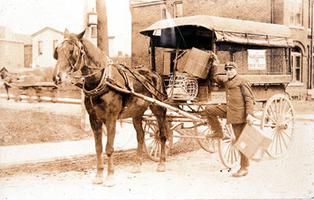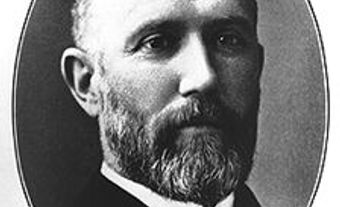This article was originally published in Maclean’s magazine on March 10, 1997. Partner content is not updated.
Eaton's: A Dynasty in Decline
Business, dear friends, is a severe conglomeration of dollars and cents. - Eaton's catalogue, 1892For generations, it was an immutable, defining symbol of Canada itself, like hockey, wheat and the RCMP. From its unremarkable beginning on 19th-century Toronto's rutted, soot-stained and manure-dotted lower Yonge Street, Timothy Eaton's dry goods store flourished with the country to become a merchandising empire - sensible, dependable, seemingly invulnerable. So when the news broke last week that the empire had floundered to the brink of bankruptcy, Canadians reacted as disbelievingly as they had when the Soviet Union first trashed their hockey team. Hockey recovered; whether Eaton's does will depend on negotiation and the resilience of the reclusive dynasty its founder created. "Many companies have gone through difficult times and emerged stronger and better," said Wal-Mart spokesman Edward Gould. "Don't count Eaton's out."
If the strength of a family's roots means anything, that is probably a sound assessment: the forceful, unsentimental Irishman who launched the family business was a tough commercial warrior. The most important theme in Timothy Eaton's entrepreneurial life, says biographer Joy Santink, "is that of competition." Eaton was born in 1834 in Northern Ireland's County Antrim, one of nine children raised by their widowed mother. At 13, he was hired by a general store 10 miles from home, walked there and back and worked 14 hours a day. After seven years, he had had enough. In 1854, he followed the example of two brothers and two sisters and emigrated to Canada, settling in the village of St. Marys, near Stratford, Ont.
Timothy's first venture was a disaster. He started a bakery at St. Marys, which folded a few months later in 1861 in the face of stiff competition. Eaton simply rented another store and notified his customers that he was switching from bread to dry goods, boots and shoes and patent medicines, which would be "sold cheap and for cash." He did little except work, once telling an acquaintance: "You know, Charlie, we never close the store in the evening while there is anybody on the street."
But Eaton tired of St. Marys and in 1869, when he was 35, he moved his family to Toronto where he paid $6,500 for the Yonge Street dry goods business known as Britannia House. (He later complained to his brother about the poor quality of the stock - "old stuff, no use here.") There were more than a dozen dry goods stores within a few blocks and Timothy had his hands full. "The past two years have been a hard tack and it will yet take a long pull and a strong pull," he wrote his brother Robert in 1870. "But it's all right - we are made to work and as long as the Lord gives me a continuation of health and energy I am determined to work and work with a will." A rival, Robert Simpson, didn't help any when he opened yet another shop, which became the seed of the Simpson's retail chain. Eaton mused that it took "a lot of customers these days to make a pile of money."
But he lured them in, the business flourished and the staff grew so rapidly that it occasionally got out of control. Nephew John James Eaton, hired as a manager, reported that departments were quarrelling with one another and he had to admonish salesgirls for becoming "lazy, saucy and impudent." At the same time, Timothy displayed moments of compassion: when six male employees volunteered for active service during the Northwest Rebellion in 1885, the proprietor held their jobs for them.
And he was quick to innovate. By the mid-1880s, his store had the novelty of electric lights and a sprinkler system, which came in handy when Robert Simpson's store burned to the ground, leaving his neighbor only singed. In 1884, Eaton distributed his first mail-order catalogue, 32 pages. He staged Grand Promenade Concerts to attract the off-street trade, and his ads described the store as "one of the best sights in the city where goods are all marked in plain figures and sold at one price to rich and poor alike." He often lectured his staff on the value of truth in advertising, but once said: "If you humbug, do it right." Yet he stood behind his merchandise - his long-standing pledge of "goods satisfactory or money refunded" became an industry standard.
Toward the century's end, Eaton's aggressive sales and advertising methods began angering smaller merchants. He endured protests, rallies and political pressure for years until it became clear that department stores were not going away. In fact, the reverse was true - in 1905, Eaton opened a Winnipeg store of five floors.
However, the Irish immigrant from Ballymena was nearing the end of the road. At 10:20 a.m. on Thursday, Jan. 31, 1907, Timothy Eaton died of pneumonia in his Toronto home, leaving an estate of $5,250,000. More than 200 carriages and several thousand mourners followed the hearse to Mount Pleasant Cemetery. His legacy: stores in Winnipeg and Toronto, factories in Toronto and Oshawa, European offices in London and Paris and 9,000 employees.
At 30, John Craig Eaton was the first in a long and uninterrupted line of Eatons to succeed to the presidency. Timothy had been austere, reserved and a devout Methodist; John Craig was an extroverted playboy who bought fancy cars, a yacht and race horses. He spent huge sums of money on foreign trips and built a 50-room mansion. When Toronto's Jewish garment workers went on strike to rid themselves of sweatshops, John C.'s final offer was to simply reinstate the workers - provided they apologized. The strike collapsed three months later.
Knighted by George V for his contributions during the First World War, Sir John in 1919 gave the company's 18,000 employees the 5 1/2-day week. In July and August, they could take off the entire day of Saturday as well. He claimed no credit, telling associates that he was just "carrying out my father's wishes." Three years later, he died at 46. His widow, Lady Eaton, raised their six children - and provided critics with endless ammunition. Women's suffrage, she once said, was a "nuisance," particularly "because it is not restricted to intelligent women." She held onto the Eaton vice-presidency until 1942 when her son, John David Eaton, became president (a nephew had the job for 20 years). She died at 91 in 1970.
Midway through the Second World War, Eaton's staff reached an all-time high of 30,000. In the 1960s, the company's dominance began to fade in the face of increasing competition from Simpsons-Sears and the growth of specialty retailers. In poor health, John David Eaton retired in 1969 when the empire was reputed to be worth $400 million. When a reporter asked him if he had ever used his clout to muzzle newspaper stories about the family, he replied: "Wouldn't you?" John D.'s Icelandic-born widow, Signy Hildur Eaton, who travelled the world with him in private planes to collect artworks or vacation at their estate in Antigua, died in 1992.
In 1977, Fred Eaton was named president of the company (and went on to serve as Canadian High Commissioner to London). Fred had a needlepoint quotation from Mao Tse-tung on his office wall in the Toronto Eaton Centre. It read: "Parasites who depend on imperialism soon find out that their bosses are not reliable. The whole situation will change when the tree falls and the monkeys scatter." In the Eaton empire, the tree has not yet fallen but the monkeys are decidedly nervous.
Maclean's March 10, 1997

 Share on Facebook
Share on Facebook Share on X
Share on X Share by Email
Share by Email Share on Google Classroom
Share on Google Classroom





